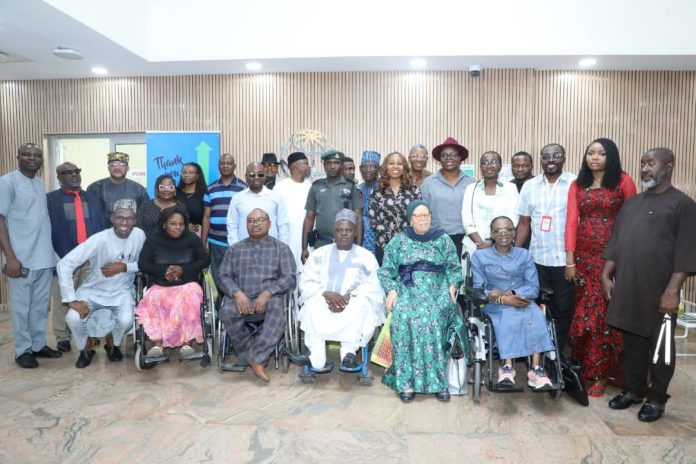Abuja, Nigeria — In a groundbreaking move to solidify disability inclusion across Nigeria, the National Commission for Persons with Disabilities (NCPWD) convened the Nigeria Partnership for Inclusive Development (NIPDID) Check-In Meeting at the World Bank office in Abuja on Wednesday. The meeting was a pivotal step toward fostering collaboration among key stakeholders and development partners to implement initiatives that prioritize the rights and inclusion of persons with disabilities (PWDs) nationwide.
The event, presided over by Chief Ayuba Gufwan, the Executive Secretary of the NCPWD, marked a milestone in the Commission’s efforts to advance the objectives of the Discrimination Against Persons with Disabilities (Prohibition) Act, 2018. Speaking to an audience of policymakers, advocates, and international organizations, Chief Gufwan emphasized the importance of unity and coordination in driving disability inclusion in Nigeria.
“Disability Inclusion Needs Collaboration,” Says Chief Gufwan
“To ensure a coordinated approach to disability inclusion, it is imperative to engage with our development partners and align on key priorities,” Chief Gufwan stated in his opening remarks. He outlined six strategic pillars that will guide the Commission’s activities in ensuring that the provisions of the Act are fully implemented:
- Strengthening governance and institutional frameworks.
- Enhancing access to assistive technologies.
- Developing a disability-inclusive policy framework.
- Expanding digital infrastructure.
- Promoting strategic awareness of inclusion programs.
- Addressing data challenges within the disability community.
Addressing the Data Crisis
Chief Gufwan highlighted a significant challenge hindering effective planning—conflicting statistics on Nigeria’s population of persons with disabilities. “We face conflicting figures on persons with disabilities daily, and we must find a lasting solution to this challenge,” he said. This issue, he noted, complicates the Commission’s ability to design and implement targeted interventions.
To tackle this, the NCPWD announced plans to work closely with relevant agencies and partners to harmonize disability data, ensuring accurate and reliable information is available for policymaking.
Sightsavers Calls for Unified Action
Representing Sightsavers, an international organization dedicated to disability rights, Esther Bature echoed Chief Gufwan’s call for collaboration. “Many organizations have similar programs for persons with disabilities, but greater impact can be achieved through roundtable discussions and coordinated implementation,” Bature remarked.
She stressed that a lack of synergy often leads to duplication of efforts, reducing the effectiveness of disability-focused programs. By fostering cooperation, Sightsavers believes stakeholders can maximize their resources and deliver more meaningful outcomes for Nigeria’s disability community.
World Bank Champions Inclusive Development
The World Bank, a key partner in the NIPDID initiative, reaffirmed its commitment to disability inclusion through its representative, Ms. Cyndi Ikeaka. She described NIPDID as a transformative platform designed to mainstream disability inclusion into Nigeria’s national development strategies.
“The NIPDID initiative encourages international and local stakeholders to allocate at least 10% of their resources to disability-focused interventions,” Ms. Ikeaka explained. She added that the initiative is in alignment with the Discrimination Against Persons with Disabilities Act, emphasizing accessibility and inclusivity in public spaces and government programs.
Key Takeaways from the Meeting
The Check-In Meeting provided an opportunity for stakeholders to evaluate progress, identify gaps, and refine strategies for achieving disability inclusion. Discussions covered critical areas such as policy harmonization, resource mobilization, and the creation of accessible environments for PWDs in Nigeria.
Participants agreed on the following priorities moving forward:
- Establishing an inclusive policy framework that addresses the unique needs of PWDs.
- Accelerating the provision of assistive technologies to improve mobility and communication for persons with disabilities.
- Enhancing public awareness campaigns to reduce stigma and promote inclusion.
A Shared Commitment to Progress
As the meeting concluded, it became clear that disability inclusion in Nigeria is no longer a task for the government alone. With organizations like Sightsavers and the World Bank stepping up their commitments, and the NCPWD providing robust leadership, the path to inclusivity is becoming more tangible.
“This is not just a meeting; it is a movement,” one participant remarked. “Together, we are laying the foundation for a Nigeria where every person, regardless of ability, can thrive.”
The Check-In Meeting has set the stage for a renewed push to embed disability inclusion in all aspects of national life, reaffirming the rights and dignity of Nigeria’s 25 million persons with disabilities.
By The Qualitative Magazine News Desk


